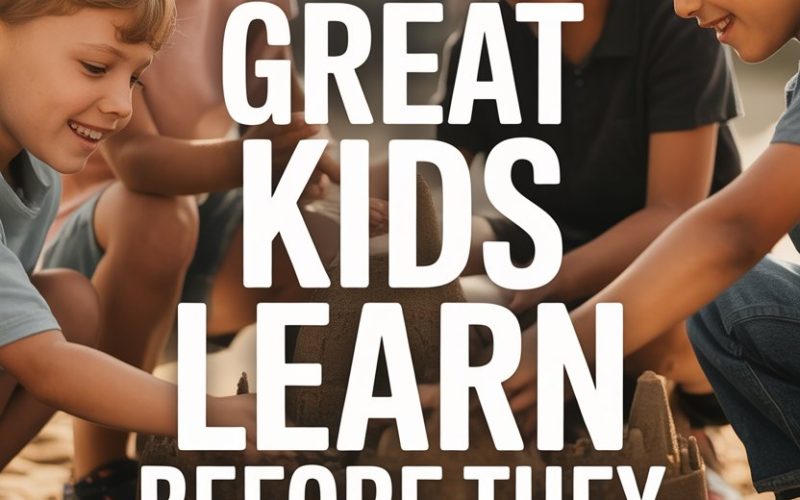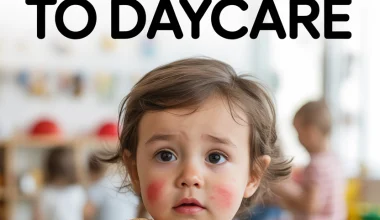Parenting is a bit like assembling flat-pack furniture without instructions—only louder, stickier, and with an audience providing real-time feedback on your technique.
Every parent wants their kids to flourish (and hopefully not draw on the walls with permanent markers).
But what are the lessons that truly stick, shaping little ones into well-rounded, resilient grown-ups? Let’s chat about what really matters.
Kindness Is More Than Good Manners
You can tell your child to say “please” and “thank you” until you’re blue in the face, but genuine kindness runs deeper.
Kids pick up empathy and compassion when they see it in action—whether it’s you offering a cup of tea to a frazzled neighbour or helping someone with heavy shopping.
Model caring by talking about feelings. “It looks like your brother is sad. How do you think you could help him feel better?” These small conversations teach children to tune in to others, not just recite social scripts.
Research from the Harvard Graduate School of Education shows empathy is crucial for future happiness and success, so never underestimate the power of a heartfelt cuddle or an encouraging word.
Failure Isn’t Fatal
From spelling tests to football tryouts, disappointment will inevitably rears its stubborn little head. The temptation to rescue your child at every turn is strong—no one likes seeing their kid’s bottom lip wobble.
But learning to handle setbacks with grit and a pinch of perspective is what builds real resilience.
Praise effort, not just winning. “You worked so hard on that project—what do you want to try differently next time?” It’s the learning from mistakes, not the avoidance of them, that sets kids up for the long haul.
As Carol Dweck’s research on growth mindset suggests, focus on progress, not perfection.
Curiosity Beats Cramming
Some children are born question machines (“Why is the sky blue? Why do beans make you toot?”), while others might need a gentle nudge. Wonder feeds intelligence.
Encourage your child’s questions, even when you’re tired and the answers demand a quick Wikipedia search.
Ask open-ended questions yourself. “What do you think would happen if…?” is a great conversation starter during car rides or while peeling carrots.
Curiosity isn’t just about facts; it’s about a lifelong love of learning. A report from UNICEF links curiosity with better academic and life outcomes, and it’s never too late to spark it.
Friendship Isn’t Always Easy
School playgrounds are the birthplace of alliances, heartbreak, and the odd squabble over who gets the last swing. Social skills don’t come pre-installed; they’re learned on the job, sometimes the hard way.
Talk about the ups and downs of friendship. Normalize disagreements. “It sounds like you and Sam had a tough day. What could help next time?” Role-play tricky scenarios and model healthy conflict resolution.
Emotional intelligence, according to research from Yale’s Center for Emotional Intelligence, is strongly linked to both well-being and school success.
Money Doesn’t Grow on Trees
Even the youngest kids can grasp the basics of saving, sharing, and spending—at least when pocket money is involved. Give children small chances to manage their own coins, whether it’s buying an ice cream or saving up for a toy.
Shop together and talk through decisions: “We could get this now, or save for something bigger later.” The Money and Pensions Service recommends regular chats about money from an early age to build positive habits.
And don’t be afraid to let them make the occasional not-so-brilliant purchase. Few things teach value like a low-quality toy that breaks after ten minutes.
Digital Skills With Training Wheels
Screens are everywhere, and even an ancient mobile can be a source of fascination (or frustration). Tech smarts go beyond knowing how to unlock a phone.
Great kids learn to question what they see online, protect their privacy, and balance screen time with offline adventures.
Set simple, clear boundaries around devices—no phones at the dinner table, for example. Model healthy behaviour: “I’m putting my phone away because family time matters.”
Talk regularly about privacy and online safety without making it all doom and gloom. The NSPCC offers a helpful guide on starting these conversations.
Standing Up for Themselves and Others
Assertiveness sometimes gets confused with being pushy, but it’s really about confidence and boundaries. Kids who can say “no” (without a side of sass) and speak up for what’s right are better equipped to handle peer pressure and bullies.
Role-play tricky situations—how to respond if someone asks them to do something that feels wrong, or how to support a classmate who’s being left out.
Dr. Michele Borba, an educational psychologist, notes that practicing these skills at home is key to building moral courage.
Chores Are Character-Building (Promise)
No child has ever leapt from the sofa, joyfully shouting, “Hooray, it’s time to fold the laundry!” But pitching in with household tasks teaches responsibility, teamwork, and a sense of accomplishment.
Share chores in age-appropriate ways. Toddlers can match socks, older kids can set the table or walk the dog. Don’t expect perfection—celebrate effort.
Research from the University of Minnesota confirms that children who regularly do chores grow up to be more independent adults.
How to Apologize and Forgive
Everyone messes up—toddlers, teenagers, even parents muttering things under their breath on the school run. What matters isn’t avoiding mistakes, but knowing how to make amends.
Show your child how to apologize genuinely (“I’m sorry I hurt your feelings. How can I make it right?”) and how to accept apologies without holding a grudge.
Family therapist Dr. Laura Markham recommends practicing apologies and forgiveness at home, so these skills become second nature.
Appreciation for Differences
The world is full of people who look, sound, and think differently. Celebrate these differences at home. Read books from a range of cultures, try new cuisines, and talk openly about fairness and respect.
Simple conversations about diversity and inclusion prepare kids to thrive in a global world. UNICEF highlights that children exposed to diverse experiences are more adaptable and empathetic.
Plus, who doesn’t want to discover a new favourite snack from halfway around the world?
Self-Care Isn’t Selfish
It’s easy for kids to get swept up in busyness—school, activities, friends. Somewhere along the way, learning to listen to your own needs becomes a superpower.
Teach your children simple self-care habits. Encourage them to take quiet breaks, move their bodies, and notice their feelings.
Make it a family affair—Sunday afternoon walks or a tech-free hour before bed can do wonders for everyone’s sanity.
Love Isn’t Conditional
Children thrive when they feel loved for who they are, not just what they achieve. Celebrate effort, quirks, and all.
Remind your child regularly (even on the days when their sibling’s hair is mysteriously covered in glitter) that your love doesn’t go up and down with their behaviour. Consistent, unconditional support is the bedrock of confidence.
Letting Go—Just a Little
Every parent knows that bittersweet feeling: holding on, and learning to let go. It starts with wobbly steps away from the living room and builds to the first solo sleepover, the first bus ride, the first job.
Allow children space to try, stumble, and grow. Give them chances to solve their own problems, even if you’re itching to swoop in.
The best gift you can give is the gentle confidence that they can stand on their own two feet—occasionally in odd socks, but ready for what comes next.
Parenting for Tomorrow
The most important things children learn before they’re grown don’t always arrive via flashcards or carefully curated experiences.
They’re absorbed in the gentle rhythms of family life: the way you treat others, the stories you share, the patience you muster on those very, very long days.
Each lesson—kindness, resilience, curiosity—plants a seed. Some sprout overnight; others take a bit longer (just like that mysterious project in the back of the fridge).
Keep watering them with love and encouragement. The garden you’re growing is worth it—even if the tools are occasionally sticky and the gardener is running on caffeine and optimism.




